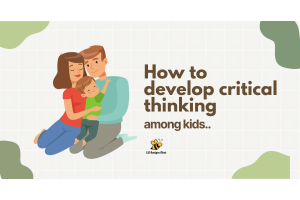How can you teach your child to resolve conflicts?

Every kid will experience ups and downs in their life where they go out in to the real world and start making new friends. They might get into a conflict with their friends or disagree with them.
This is all part of growing up and as their parents you might sometimes need to prepare them for solving conflicts on their own and take a step back.
Preparing your child for strategies to cope up with conflicts and stress will help them be able to work through their issues in a calm, matured way and preserve their friendships as well.
There are various strategies to help your child to resolve conflicts with their friends or you as listed down below:
1- Take a few seconds
Ask your child to close their eyes and take deep, calming breaths.
Let him take a few moments to evaluate how he feels and if he is feeling hurt, sad, scared or angry.
By doing this he will not make rash decisions but instead try to take a step back and re-evaluate his feelings and act accordingly.
Sometimes they don’t have to come up with a solution immediately and can instead play a game or read their favourite book to feel better and then come back and evaluate the issue in hand.
2- Role model
It’s natural for your child to follow in your footsteps.
If they watch you make model decisions and act rationally in every situation this will teach them to behave the same way as well.
3- Model empathy
As their parents, be sympathetic towards their issue even if it might not seem like a big deal to you.
When your child comes and vents to you about their problem learn to listen to them as a friend instead of just advising them.
Ask them if they need to just vent out their feelings and need someone to listen to them or they need advise from you.
Their problem might not seem a big deal to you but coming to you with their problem is how they learn to cope with stress so always be welcoming to listen to their problem.
You can provide them a safe space for them to vent out their emotions and process their feelings even if you can’t solve their issue for them.
4- Talk about feelings
The more you teach your children to talk about their feelings the more they will learn to recognise each emotions and vent it out in a healthy manner.
A lot of children who grow up in households where emotions are not talked about and dismissed quickly learn to do this as well even when they turn adults.
By talking about their feelings clearly they won’t get carried away with blaming someone but resort to focusing on their behaviour instead.
5- Brainstorming
While it might seem easier to just give a solution to your child but it’s better if you and your child brainstorm ideas and come up with a solution together.
This will ensure they know every option to resolve their issue and which works the best in this scenario.
For example if they have a conflict with their classmate they can write down what they want to tell their classmate and why they feel this way. Next they can put themselves in their friend’s shoes and try to understand where they were coming from.
This will of course take a lot of tries but your child will learn to be sympathetic and kind to everyone and not just blame someone else quickly.
Looking at solutions from different perspectives will help your kid to empathise with their friends and understand them better.
6- Problem solving jar
When your child brainstorms ideas or solutions for their problems they can put these written ideas in a jar.
This jar can come in helpful for them in the future if they are going through something similar and need a reminder on how to cope up.
Conclusion
Every kid needs to learn skills to resolve issue on their own instead of running up to their parents to solve it for them.
Being a healthy role model and allowing your child to vent out their feelings with you will go a long way to shaping them up as responsible, matured adults in touch with their emotions and feelings.
For more such blogs, please visit our site : https://lilamigosnest.com


























